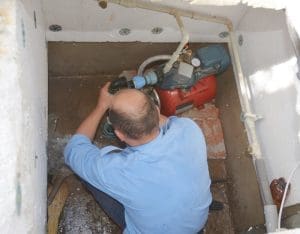A well inspection is extremely important. It enables you to protect your valuable investment! Our inspectors can detect potential issues early on by conducting thorough well inspections and preventing costly repairs. Based on our professional experience, well inspections provide valuable insights into effectively maintaining your well’s health. Pay close attention to this article to discover the importance of water well inspections and how they contribute to preserving clean and reliable water sources for generations to come.

Importance of Regular Inspections
Benefits of Routine Checks
Scheduling regular checks ensures the safety and quality of your water supply. We can identify potential issues early on if they exist. If we do not find issues, we will leave you with “peace of mind.”
Regular inspections also help maintain compliance with regulations set by the health department. This proactive approach safeguards your health and prevents costly repairs from neglected maintenance.
Ensuring Water Purity
We will assess various aspects such as water flow, pump efficiency, and overall well condition during a thorough inspection. Identifying any contamination sources or structural weaknesses is crucial in preserving the purity of your water source.
Identifying Well Inspection Common Issues
Water Contamination
When we conduct water well inspections, one common issue is water contamination. This can arise from various sources, such as septic systems, agricultural runoff, or nearby industrial activities. To address this, water quality tests are essential to determine the presence of harmful substances.
Low Water Quantity
Low water quantity is another prevalent problem in water wells, leading to inadequate water supply. Factors like drought, over-pumping, or geological changes can contribute to this issue. Monitoring your well regularly is crucial to ensure a sustainable water source.
Equipment Malfunction
We might find an equipment malfunction. This is a significant concern. Components such as pumps, pressure tanks, or electrical systems can fail over time due to wear and tear. Regular inspections help identify these issues early on and allow timely repairs.
Corrosion and Scaling
Corrosion and scaling within the sound system can impact water flow and quality. Over time, mineral deposits can accumulate on pipes and equipment, affecting the well’s efficiency. Implementing proper maintenance practices can prevent these issues and prolong the lifespan of your water supply system.
Steps in the Water Well Inspection Process
Initial Assessment
When we conduct a water well inspection, the first step is to assess the well structure and surroundings. We check for any visible signs of damage or contamination and an inspection on the surface.
Water Quality Testing
After the initial assessment, you must conduct water quality testing to ensure that the water from the well meets safety standards. This involves analyzing samples for contaminants like bacteria, nitrates, and other harmful substances.
Pump and Flow Rate Check
Next, we inspect the pump system and measure the water flow rate from the well. This step helps determine if the pump is functioning correctly and if there are any issues with water flow.
Documentation and Reporting
Once all inspections are complete, we provide a detailed report outlining any issues during the inspection process.
Equipment Used in Water Well Inspections
Essential Tools
When inspecting a water well, we use various tools to ensure everything is in working order. These tools include pressure gauges, water level indicators, and flow meters.
To assess the condition of the storage tank, we often use specialized equipment, such as borescopes, to visually inspect the interior for signs of corrosion or damage.
Key Inspection Points to Consider
Areas to Focus On
When inspecting a water well, we focus on critical areas such as the pump, pressure tank, and electrical components. These are crucial for ensuring healthy functions optimally.
Cost Considerations
Consider the costs involved in maintaining a water well. Factor in expenses for repairs, upgrades, and routine inspections to ensure your system remains in good condition.
Importance of Regular Inspections
Regular inspections can help you catch potential issues early on, saving you time and money in the long run. By staying proactive, you can take care of your worries quickly.
Professional Help
Sometimes, it’s best to seek professional help for thorough inspections. A professional can provide valuable information about your well’s condition and necessary maintenance tasks.
When to Schedule Your Water Well Inspection
Booking Timing
It’s crucial to plan. We recommend booking inspections at least once a year.
Please make sure you schedule the inspection when you can be there. This allows you to ask questions and understand any potential issues that may arise.
Seasonal Considerations
Could you consider scheduling your water health inspection after heavy rainfall or snowmelt periods? This timing helps evaluate how effectively your well handles excess water flow.
We also advise booking inspections before the peak of summer or winter, as extreme temperatures can impact sound performance.
Understanding Inspection Results
Interpreting Findings
When you receive the results of your water well inspection, it’s essential to understand what they mean. Please look for any issues or concerns highlighted in the report.
We may identify problems such as low water pressure, contamination risks, or equipment malfunctions. These findings require attention to ensure optimal health functions.
Addressing Concerns
If the inspection report raises red flags, don’t panic. Please take proactive steps to address any concerns as soon as possible. This may involve repairing faulty components, adjusting water flow rates, or implementing filtration systems.
Resolving Issues Found During Your Inspection
Addressing Mechanical Defects
When mechanical defects are found during a water well inspection, you will need to quickly address them to ensure the proper functioning of your well. Common mechanical issues include pump malfunctions, leaky pipes, or pressure tank problems.
Hiring a professional to find and repair these defects efficiently is crucial. Neglecting mechanical issues can lead to more significant problems, impacting the quality and safety of your water supply.
Dealing with Contaminants
If contaminants like coliform bacteria are detected in your well during an inspection, you will need immediate action. These contaminants pose serious health risks if consumed and indicate potential sewage or surface water intrusion.
To address this issue effectively, you may need to disinfect the well using chlorine or other appropriate methods. Regular testing post-treatment is essential to ensure the contaminants have been eliminated.
Closing Thoughts
Now that you understand the importance of regular water well inspections, identifying common issues, the inspection process, equipment used, key points to consider, scheduling, understanding results, and resolving issues found during inspections, you are better equipped to ensure the safety and efficiency of your water supply. By staying proactive and conducting routine inspections, you can catch potential problems early, saving you time and money and ensuring the well-being of your household.
Take your time when an issue arises; schedule your water well inspection today to guarantee clean and reliable water for you and your loved ones. Your diligence in maintaining your well will provide peace of mind and contribute to a healthier environment for all. Keep your water flowing smoothly by taking action now!
Frequently Asked Questions
What is the significance of regular water well inspections?
Regular water well inspections are crucial for ensuring water quality, identifying potential issues early, and maintaining the efficiency of your water supply system. By conducting regular inspections, you can prevent costly repairs and safeguard your family’s health.
What are some common issues that can be identified during an inspection?
Common sound issues include low water pressure, sediment buildup, bacterial contamination, faulty equipment, and structural damage. Identifying these problems early through inspections can prevent more extensive damage and ensure safe drinking water for your household.
What equipment is typically used during an inspection?
During a good inspection, we may use pressure gauges, flow meters, water level indicators, cameras for down-hole viewing, and sampling equipment. These tools help assess the condition of the healthy components and determine if any issues are present.
When should I schedule a water well inspection?
You should schedule a water well inspection at least once a year or whenever you notice changes in water quality or quantity after extreme weather events or if you suspect contamination or system malfunctioning.
How do I interpret the results of an inspection?
Understanding the results involves reviewing parameters like water quality tests (bacteria levels), flow rate measurements, and pump performance evaluations. A professional inspector will provide detailed insights into any issues found during the inspection and recommend appropriate solutions to address them effectively.


0 Comments